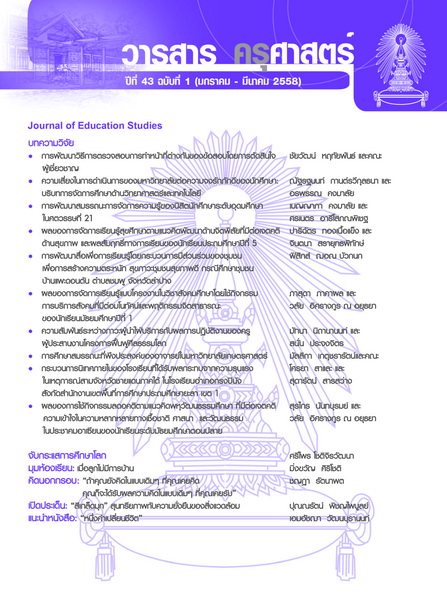การพัฒนาสมรรถนะการจัดการความรู้ของนิสิตนักศึกษา ระดับอุดมศึกษาในศตวรรษที่ 21
Keywords:
สมรรถนะการจัดการความรู้, นักศึกษาระดับอุดมศึกษาในศตวรรษที่ 21, KNOWLEDGE MANAGEMENT COMPETENCIES, HIGHER EDUCATION STUDENT IN THE 21st CENTURYAbstract
การพัฒนาสมรรถนะการจัดการความรู้ของนิสิตนักศึกษาระดับอุดมศึกษาในศตวรรษที่ 21 มี วัตถุประสงค์เพื่อวิเคราะห์และสังเคราะห์แนวคิดเกี่ยวกับกระบวนการพัฒนาสมรรถนะการจัดการความรู้ ของนิสิตนักศึกษาระดับปริญญาบัณฑิต และ ศึกษาสภาพปัจจุบัน ปัญหาและอุปสรรคเกี่ยวกับการพัฒนา สมรรถนะการจัดการความรู้ของนิสิตนักศึกษาระดับอุดมศึกษาในศตวรรษที่ 21 มี ข้อมูลในการศึกษาวิจัย มี 2 กลุ่ม ได้แก่ 1. ศึกษาเอกสารและสังเคราะห์แนวคิด ทฤษฎี และงานวิจัยที่เกี่ยวข้องตั้งแต่ปี ค.ศ. 1963-2013 จำนวน 140 รายการ 2. นิสิตนักศึกษาที่กำลังศึกษาอยู่ในสถาบันอุดมศึกษา จำนวน 618 คน เครื่องมือที่ใช้ในการวิจัยประกอบด้วย การวิเคราะห์เนื้อหาหาความสอดคล้องจาก หนังสือ บทความ เอกสารอิเล็คโทรนิค แบบสัมภาษณ์ แบบสอบถาม และสถิติเชิงบรรยาย ได้แก่ ค่าเฉลี่ย ร้อยละ ส่วนเบี่ยงเบนมาตรฐาน ความถี่ และเปรียบเทียบความแตกต่างระหว่างกลุ่ม
ผลการวิจัย สรุปได้ดังนี้ 1) สมรรถนะการจัดการความรู้ของนิสิตนักศึกษาระดับอุดมศึกษาใน ศตวรรษที่ 21 ประกอบด้วย 9 สมรรถนะ ได้แก่ (1) มีความรู้ด้านหลักการจัดการความรู้ (2) มีความรู้ ความเข้าใจด้านเทคโนโลยีสารสนเทศ (3) มีทักษะด้านการบ่งชี้ความรู้ (4) มีทักษะในการจัดการความรู้ (5) มีทักษะการสื่อสารระหว่างบุคคล (6) มีทักษะในการแบ่งปันความรู้ (7) มีทักษะการคิดและแก้ปัญหา (8) มีจิตสำนึกด้านคุณธรรม จริยธรรม และความซื่อสัตย์ในการจัดการความรู้ และ (9) มีความรับผิดชอบ ในการแบ่งปันความรู้ 2) สรุปผลการประเมินสมรรถนะการจัดการความรู้ ของนิสิตนักศึกษาระดับอุดมศึกษา ในศตวรรษที่ 21 ทั้ง 9 สมรรถนะพบว่า สมรรถนะการจัดการความรู้ของนิสิตนักศึกษาระดับอุดมศึกษาใน ศตวรรษที่ 21 โดยรวมอยู่ในระดับปานกลาง (ค่าเฉลี่ย 3.25) อย่างมีนัยสำคัญทางสถิติที่ระดับ .05 เมื่อ พิจารณารายข้อ พบว่า สมรรถนะที่ค่าเฉลี่ยตำสุดคือ สมรรถนะด้านความรู้ความเข้าใจด้านเทคโนโลยี สารสนเทศอยู่ในระดับปานกลาง (ค่าเฉลี่ย 2.89) อย่างมีนัยสำคัญทางสถิติที่ระดับ .05 สมรรถนะ ที่ค่าเฉลี่ยสูงสุดคือ สมรรถนะการมีจิตสำนึกด้านคุณธรรมจริยธรรมอยู่ในระดับดี (ค่าเฉลี่ย 3.57) อย่างไม่มีนัยสำคัญทางสถิติที่ระดับ .05
Under the title of the development of knowledge management competencies of higher education students in the 21st century, the research’s purposes were to analyze and synthesize concepts concerning the process of the knowledge management competencies of undergraduate students and study the current status, problems and obstacles to knowledge management competency, and develop forms of knowledge management competencies for undergraduate students in the 21st century.
There were two groups of samples: 1) Document research from books, articles, documents, websites and related research during 1963-2013, totaling 140 items; 2) 618 undergraduate students of 7 government universities studying 3 majors following the ISCED standard. The instruments were content analysis for analyses and document research from books, articles and related documents, opened-end questions for an in-depth interview, questionnaires, an assessment form and a record form. Data were analyzed by means of content analysis and descriptive statistics; mean, percentage, standard deviation, two-way ANOVA, and paired t-test. The results were as follows. 1) The knowledge management competency of undergraduate students consisted of: (1) Content comprising knowledge management; (2) understanding about information technology; (3) knowledge identification; (4) knowledge management skills; (5) interpersonal communication; (6) knowledge sharing; (7) thinking and problem solving skills; 8) knowledge management ethics and honesty; and 9) knowledge sharing responsibility. 2) The total mean of the knowledge management competency of undergraduate students was at a medium level (mean = 3.25) at the statistically significant level of .05. When considering each aspect, understanding about information technology was found to be the lowest ranked competency, at a medium level (mean = 2.89) at a statistical significance of .05, whereas conscientiousness toward virtue, ethics and honesty in knowledge management had the highest mean, ranked at a good level (mean = 3.57) without the statistical significance of .05.




